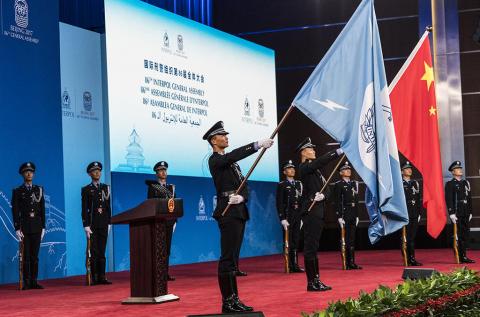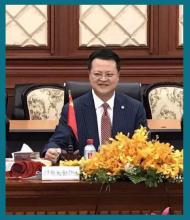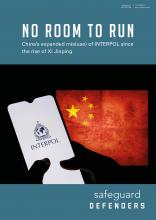China seeks election to INTERPOL
Today it is revealed that a member of China's police force - under the Ministry of Public Security (MPS) - is standing for election to INTERPOL's 13-member Executive Committee. Parliamentarians and activists from across the world are calling on governments to block the election of the CCP candidate, Hu Binchen.
INTERPOL's 89th General Assembly, which collects representatives from its 194 member states, will meet on November 23-25 in Istanbul, Turkey, to, among other things, elect its Executive Committee, in most cases for a three-year term. For the two seats for delegates from Asia, Hu Binchen is one of three candidates, alongside those of Singapore and India.

See the list of candidates here (PDF:)
INTERPOL's former Chairman (2016-2018), China's Meng Hongwei, a Chinese Communist Party (CCP) member and Vice-Minister of the MPS, was disappeared while on a trip back to China, placed into one of China's systems for enforced disappearances (Liuzhi) for half a year, and later imprisoned, cutting his mandate period as INTERPOL chairman short.
In response to the potential election of Hu Binchen, 50 parliamentarians from 20 countries, are now calling on national governments to ensure Hu is not elected. It says his election to the body would be yet another move by the PRC "to gain influence over the global policing body" and that his election could lead to INTERPOL being used as "a vehicle for the PRC government’s repressive policies.” The letter also points out past misuse of INTERPOL by China to go after dissidents in exile.
A the same time, 38 Chinese, Hong Kong, Tibetan, and Uyghur activists, including former lawmakers, and NGO leaders, many of whom live in fear of potential misuse of INTERPOL already, also wrote the governments imploring they take measures to stop Hu's election, saying "Hu Binchen’s candidacy and persona is exemplary of China’s attempts to abuse multilateral institutions for its own repressive interests".
Read the full letter from the 38 activists (PDF):

 At the same time as attention is being paid to China's candidacy to its Executive Committee, Safeguard Defenders today released the first-ever investigation into China's use and misuse of INTERPOL, and the dramatic change in how it engages with INTERPOL after Xi Jinping's "anti-corruption" campaign began, in particular its international arm, Sky Net and Fox Hunt. That investigation is now available, read about it here. It notes a ten-fold increase in the use of Red Notices between 2000 and 2020, and a five-time increase in the use of Diffusions, a tool very similar to a Red Notice, but which is far more prone to abuse. The investigation presents available data on China's use of INTERPOL, and the various methods used to abuse the system, often in clear violation of INTERPOL charter - abuse that goes far beyond merely issuing Red Notices (or Diffusions) for dissidents in exile.
At the same time as attention is being paid to China's candidacy to its Executive Committee, Safeguard Defenders today released the first-ever investigation into China's use and misuse of INTERPOL, and the dramatic change in how it engages with INTERPOL after Xi Jinping's "anti-corruption" campaign began, in particular its international arm, Sky Net and Fox Hunt. That investigation is now available, read about it here. It notes a ten-fold increase in the use of Red Notices between 2000 and 2020, and a five-time increase in the use of Diffusions, a tool very similar to a Red Notice, but which is far more prone to abuse. The investigation presents available data on China's use of INTERPOL, and the various methods used to abuse the system, often in clear violation of INTERPOL charter - abuse that goes far beyond merely issuing Red Notices (or Diffusions) for dissidents in exile.